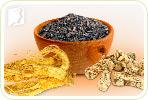It is not uncommon for women between the ages of 44 - 55 to awaken in the night and find themselves drenched in sweat. This common menopause symptom is known as night sweats, and it's the nocturnal equivalent to the hot flashes that women often experience during the day. As in the case of regular sweating, night sweats create a very favorable environment for bacteria, and can create unpleasant and embarrassing body odor. Those who share a bed with their partner can find their experience particularly distressing.
Wash Thoroughly
Showering before bed ensures that any sweats that occur during the night are not given the opportunity to react with bacteria accumulated throughout the day. If you experience night sweats, it's important to also shower in the morning so that bacteria and odor that might have amassed during the night can be removed. Use soap and pay particular attention to areas that are most likely to sweat (e.g., armpits, genitals, or feet).
Use Cotton Bed Sheets
Bed sheets made from synthetic fabrics are best avoided as they prevent your skin from getting access to the air it needs for rapid moisture evaporation. Opt for cotton bed sheets and change them regularly to ensure they don't accumulate excess odors and sweat.
Shave Armpit Hair Regularly
Armpit hair traps sweat and provides ideal bacteria breeding grounds that can potentially lead to odor. Shaving your armpits regularly will reduce the chance of odor being emitted from armpit hair.
Use Antiperspirant
Applying antiperspirant to dry armpits before going to bed or after showering will reduce the amount of sweat your body produces. Many antiperspirant's also have fragrances that can help mask odor. Applying talcum powder to sweat-prone areas might also help to absorb excess moisture.
Wear Natural Fibers
Synthetic fabrics (e.g., polyester, nylon) can be oppressive on your skin cells, whereas pajamas made of cotton, wool, or silk, allow skin to breathe and sweat to evaporate. (Alternatively, not wearing anything at all maximizes this effect!) As with bed sheets, ensure that any pajamas you opt for are washed regularly to remove odor build-up.
Consider Your Diet and Habits
Strong aromas, such as garlic, red meat, curry, tobacco, alcohol, and caffeine have been shown to have negative effects on body odor and night sweats. It is advisable therefore to limit your consumption of these items.
For the purposes of confidence and self-esteem, it is important that you feel as fresh as possible during the menopause transition. Although the above steps might not entirely prevent night sweats from occurring, they can help ensure that sweats don't become overly unpleasant, unhygienic, or embarrassing.
Sources
- Havlicek, J. & Lenochova, P. (2006). The effect of meat consumption on body odor attractiveness. Chemical senses, 31(8), 747-752. Retrieved from http://www.ncbi.nlm.nih.gov/pubmed/16891352
- National Health Service UK. (2012). Body odour. Retrieved January 13, 2014, from http://www.nhs.uk/conditions/body-odour/Pages/Introduction.aspx




